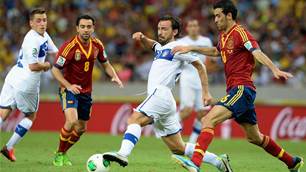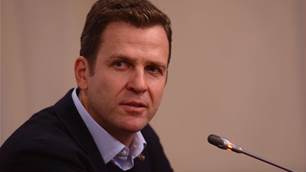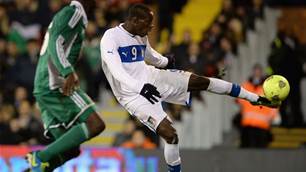The greatest player of his generation, Zinedine Zidane’s career ended in an eruption of violence. One year on, he’s still feeling the aftershocks...
Page 2 of 3 | Single page
Oh Ambassador, you're really spoiling us
Since that tumultuous night, Zidane the footballer is no more. The first year of his “retirement” though, has been anything but relaxing. Already tied to several major companies for advertising work while he was playing, Zidane now commits 120 days per year to a group of employers which include Canal Plus, Danone, Adidas, Generali, GrandOptica and Orange. We’ve seen Zidane all over the place, though rarely without an economic motive.
In November, he was in Bangladesh, opening a factory for Danone and chatting with Muhammad Yunus, the 2006 Nobel Peace Prize winner. Zidane, who seemed genuinely surprised at his megastar status in one of the world’s poorest nations, was easily persuaded to join in a match between local kids, even though he was dressed in shirt and jeans.
In Thailand in February, he played in a gala game organised by Adidas in benefit of children affected by AIDS and, with his wife, was spotted ringside at a Thai boxing event. The same month, Veronique also accompanied her husband to New York during the Big Apple’s Fashion Week.
A not-too-comfortable-looking guest of honour alongside the catwalk at the Y-3 show, Zidane was not exactly cutting edge in his jeans, leather jacket and trainers. His presence, though, assured a certain amount of media coverage for the line produced for Adidas by Japanese designer Yohji Yamamoto.
Some of his promotional work is the stuff of classical advertising – witness his photo on giant billboards for the insurance group Generali – slogan: “How did I choose Generali? I used my head!”. More often though, companies opt to use Zidane as a kind of roving ambassador for their brands, milking the feel-good factor that the simple presence of this furiously-gifted player can generate. This approach makes sense to companies looking to create a buzz, an event, but it actually forces Zidane to operate in the kind of situations in which he is least at ease.
A kind of anti-Beckham, Zidane is still uncomfortable in front of the camera, despite all the years of practice. His body language when confronted by media hordes tells you he would rather be elsewhere. And even when working with those he knows well at Canal Plus, who use him as a star presence at certain sports events, Zidane can appear to struggle for his words or give flat, monosyllabic replies. It was OK, in an Alan Shearer kind of way, when he was a player, but now he’s being paid to be in the studio, more is expected from him. And the most exasperating thing for the French broadcasting giant is that once the lights are off, he’s back to his fluent, jokey self.
Christophe Dugarry, who Canal Plus also signed up last season, has been one of Zidane’s closest friends ever since they played together at Bordeaux. After the not-very-exciting press conference to announce Zidane’s arrival as a Canal Plus man, Dugarry was at pains to point out that the Zidane people see at such times is not the same as the one he hangs out with. “Do you really think I’d spend my holidays with the Zidane you see on the telly?” he guffaws.
A little bit of politics
More than 600 million people worldwide tuned in to the 2006 World Cup Final, double the audience of any other sporting event and by far the biggest TV happening of the year. Many would have been willing Zidane on, hoping for a glorious swansong for a player whose sublime skills had marked him out as the best of his generation and one of the greatest of all-time.
It took only seven minutes for Zidane to light up the final in the most unexpected of ways. Penalty for France. Zidane versus Buffon, the world’s greatest goalkeeper. Breaking all the rules of convention, Zidane decided not to take it in his usual manner. Instead of firing low and hard to the keeper’s right, he sent a gentle chip to Buffon’s left. The ball hit the underside of the bar and bounced down well behind the goal-line: 1-0 to France. Zidane had scored from what on the Continent they call a "Panenka"‚ in tribute to the Czechoslovakia player Antonin, who scored in similar fashion with the final kick of the shoot-out in the 1976 European Championship Final to hand his side victory over West Germany. Later Zidane explained that he felt the need “to do something different against Buffon”. His team-mates, meanwhile, were torn between admiration and incredulity. Willy Sagnol, one of Zidane’s few real confidants, thought “he was mad”.
Patrick Vieira, another of the inner circle, put it most concisely: “If we’d won 1-0, with Zidane scoring from the penalty the way he did, can you imagine the reaction?” he asks. “Zidane for President!” Instead, France ended up with Nicolas Sarkozy.
Since that tumultuous night, Zidane the footballer is no more. The first year of his “retirement” though, has been anything but relaxing. Already tied to several major companies for advertising work while he was playing, Zidane now commits 120 days per year to a group of employers which include Canal Plus, Danone, Adidas, Generali, GrandOptica and Orange. We’ve seen Zidane all over the place, though rarely without an economic motive.
In November, he was in Bangladesh, opening a factory for Danone and chatting with Muhammad Yunus, the 2006 Nobel Peace Prize winner. Zidane, who seemed genuinely surprised at his megastar status in one of the world’s poorest nations, was easily persuaded to join in a match between local kids, even though he was dressed in shirt and jeans.
In Thailand in February, he played in a gala game organised by Adidas in benefit of children affected by AIDS and, with his wife, was spotted ringside at a Thai boxing event. The same month, Veronique also accompanied her husband to New York during the Big Apple’s Fashion Week.
A not-too-comfortable-looking guest of honour alongside the catwalk at the Y-3 show, Zidane was not exactly cutting edge in his jeans, leather jacket and trainers. His presence, though, assured a certain amount of media coverage for the line produced for Adidas by Japanese designer Yohji Yamamoto.
Some of his promotional work is the stuff of classical advertising – witness his photo on giant billboards for the insurance group Generali – slogan: “How did I choose Generali? I used my head!”. More often though, companies opt to use Zidane as a kind of roving ambassador for their brands, milking the feel-good factor that the simple presence of this furiously-gifted player can generate. This approach makes sense to companies looking to create a buzz, an event, but it actually forces Zidane to operate in the kind of situations in which he is least at ease.
A kind of anti-Beckham, Zidane is still uncomfortable in front of the camera, despite all the years of practice. His body language when confronted by media hordes tells you he would rather be elsewhere. And even when working with those he knows well at Canal Plus, who use him as a star presence at certain sports events, Zidane can appear to struggle for his words or give flat, monosyllabic replies. It was OK, in an Alan Shearer kind of way, when he was a player, but now he’s being paid to be in the studio, more is expected from him. And the most exasperating thing for the French broadcasting giant is that once the lights are off, he’s back to his fluent, jokey self.
Christophe Dugarry, who Canal Plus also signed up last season, has been one of Zidane’s closest friends ever since they played together at Bordeaux. After the not-very-exciting press conference to announce Zidane’s arrival as a Canal Plus man, Dugarry was at pains to point out that the Zidane people see at such times is not the same as the one he hangs out with. “Do you really think I’d spend my holidays with the Zidane you see on the telly?” he guffaws.
A little bit of politics
More than 600 million people worldwide tuned in to the 2006 World Cup Final, double the audience of any other sporting event and by far the biggest TV happening of the year. Many would have been willing Zidane on, hoping for a glorious swansong for a player whose sublime skills had marked him out as the best of his generation and one of the greatest of all-time.
It took only seven minutes for Zidane to light up the final in the most unexpected of ways. Penalty for France. Zidane versus Buffon, the world’s greatest goalkeeper. Breaking all the rules of convention, Zidane decided not to take it in his usual manner. Instead of firing low and hard to the keeper’s right, he sent a gentle chip to Buffon’s left. The ball hit the underside of the bar and bounced down well behind the goal-line: 1-0 to France. Zidane had scored from what on the Continent they call a "Panenka"‚ in tribute to the Czechoslovakia player Antonin, who scored in similar fashion with the final kick of the shoot-out in the 1976 European Championship Final to hand his side victory over West Germany. Later Zidane explained that he felt the need “to do something different against Buffon”. His team-mates, meanwhile, were torn between admiration and incredulity. Willy Sagnol, one of Zidane’s few real confidants, thought “he was mad”.
Patrick Vieira, another of the inner circle, put it most concisely: “If we’d won 1-0, with Zidane scoring from the penalty the way he did, can you imagine the reaction?” he asks. “Zidane for President!” Instead, France ended up with Nicolas Sarkozy.
Related Articles

Spain versus Italy to go ahead

Germany preparing for World Cup success













